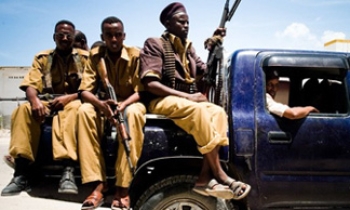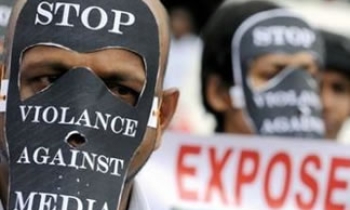BAGHDAD, 9 April 2007 (IRIN) - BAGHDAD, 9 April 2007 (IRIN) - The arrests, abductions and murders of journalists in Iraq are severely limiting the ability of media outlets to effectively report the escalating humanitarian crises in the war-torn country, specialists say.
In the run-up to the fourth anniversary of the fall of Baghdad, on 9 April, media associations are calling on the government and armed groups to respect the rights of journalists.
"We again call on Prime Minister Nouri al-Maliki's government to do everything possible to protect journalists and to prosecute those who persecute them. The work of the media in war-torn Iraq is vital, and everything possible must be done to protect it," said Reporters Without Borders (RWB), a media freedom watchdog, on 6 April in a statement.
"In addition to experiencing permanent insecurity, journalists are increasingly being unfairly arrested and subjected to improper searches by Iraqi security forces and the US army," RWB added. "It is unacceptable that the majority of the media already living in fear of being murdered as they leave work or being kidnapped by sectarian militia, also have to risk arrest and detention for no valid reason."
The International Federation of Journalists (IFJ) marked the fourth anniversary of former president Saddam Hussein's ousting with a renewed call for the US to provide credible reports over a number of media deaths at the hands of its forces in Iraq, in particular the "still unexplained killing" of three international journalists on 8 April 2003.
"Four years on, still no credible reports have been produced to explain these attacks and no one has been held to account for the killings," said IFJ General Secretary Aidan White. "The United States must answer questions that are still asked over these deaths and many others at the hands of their troops in Iraq. With the number of media casualties growing daily, impunity becomes intolerable, particularly when it concerns the actions of those who speak in the name of democracy and human rights."
Spearhead against terrorism
In celebrations organised on 5 April by the Iraqi Journalists Association in solidarity with the families of slain Iraqi journalists, Prime Minister Maliki paid tribute to the work of brave journalists in Iraq. "National media outlets that are committed to serve the truth have turned into a spearhead against terrorism," he said.
At the same time, he defended restrictions his government has imposed on the media. "To protect our territory and in the public interest, the government has had to take limited measures against a number of media... that use a provocative and partisan language, full of arrogance and hate," he said.
While estimates vary for the number of media workers killed in Iraq since the US-led invasion began in March 2003, all media associations agree that Iraq has become the most dangerous country in the world for a journalist to work.
Iraq has seen a steady increase in the numbers of media workers killed per year over the past four years, indicating an evidently deteriorating security situation and an increasingly difficult environment within which to report the humanitarian impact of the violence.
According to Reporters Without Borders, 158 journalists and media assistants have been killed in Iraq since the start of the conflict in March 2003. The International Federation of Journalists (IFJ) puts the figure at 196, saying 23 media workers have been killed since the beginning of the year three months ago.
The Iraqi Journalists Association says 209 Iraqi journalists and media workers have been killed over the past four years, while the Committee to Protect Journalists (CPJ) says at least 99 journalists and 37 media workers have been killed in this period. According to CPJ, more than 80 percent of all media deaths have been Iraqis working for local and international news outlets.
UN resolution to protect media
Partly as a result of the numbers of journalists being killed in Iraq, in December 2006, the United Nations Security Council passed Resolution 1738 to further protect journalists in conflict zones and adding that killing them can be considered a war crime.
Over the past week, at least four Iraqi journalists have been killed. On 5 April, a car bomb went off next to the offices of Baghdad TV, which is affiliated to the Iraqi Islamic Party- the country's largest Sunni political group. The bomb killed Thaer Ahmad Jaber, the station's deputy director and father of seven daughters, and trainee journalist Hussein Nizaer. Twelve others were injured in the blast.
One the same day, police in west Baghdad found the bullet-riddled body of Khamael Muhsin, a famous television presenter during Saddam's rule. She had been reporting on social and cultural life in Iraq for the US-funded Radio Free Iraq since 2004.
On 6 April, the body of Othman al-Mashhadani, a reporter for the Saudi newspaper Al Watan who had been kidnapped two days previously, was found in Baghdad.
The deaths cast a shadow over the commemoration of slain journalists event. "They are risking their lives to help Iraqi people by showing the country's suffering to the world - and that can't be ignored," Shuhab al-Timimi, head of the Iraqi Journalists Association, said.
Al-Timimi said that for the grieved families, the IFJ had donated about $34,000, the Iraqi government about $40,000, and other local media outlets together donated about $25,000.
"But this is not enough for these families and that we ask the government to pay pensions for these journalists and offer protection for the others [still alive]. Their families need special social care for their brave work in helping Iraqi people," al-Timimi added.







